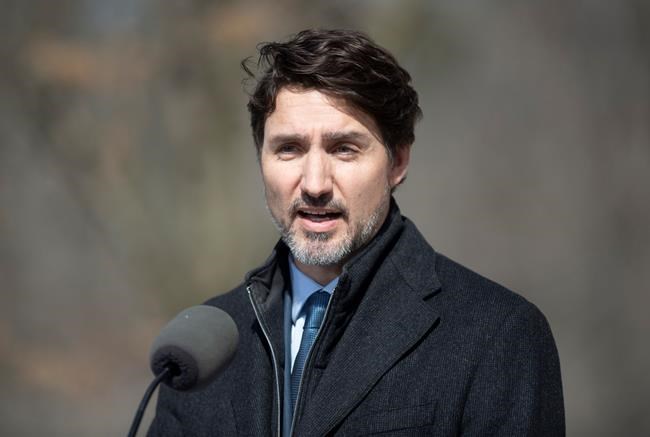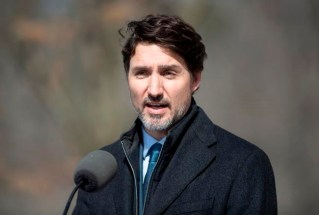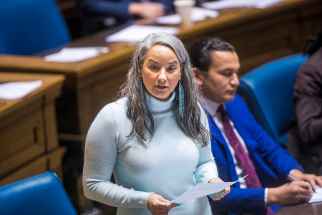Canada closes borders to most foreigners to fight spread of COVID-19
Read this article for free:
or
Already have an account? Log in here »
To continue reading, please subscribe:
Monthly Digital Subscription
$0 for the first 4 weeks*
- Enjoy unlimited reading on winnipegfreepress.com
- Read the E-Edition, our digital replica newspaper
- Access News Break, our award-winning app
- Play interactive puzzles
*No charge for 4 weeks then price increases to the regular rate of $19.00 plus GST every four weeks. Offer available to new and qualified returning subscribers only. Cancel any time.
Monthly Digital Subscription
$4.75/week*
- Enjoy unlimited reading on winnipegfreepress.com
- Read the E-Edition, our digital replica newspaper
- Access News Break, our award-winning app
- Play interactive puzzles
*Billed as $19 plus GST every four weeks. Cancel any time.
To continue reading, please subscribe:
Add Free Press access to your Brandon Sun subscription for only an additional
$1 for the first 4 weeks*
*Your next subscription payment will increase by $1.00 and you will be charged $16.99 plus GST for four weeks. After four weeks, your payment will increase to $23.99 plus GST every four weeks.
Read unlimited articles for free today:
or
Already have an account? Log in here »
Hey there, time traveller!
This article was published 16/03/2020 (2104 days ago), so information in it may no longer be current.
OTTAWA – Canada is closing its borders to most foreign nationals except Americans and is barring anyone, including Canadian citizens, with symptoms of the novel coronavirus from boarding flights to this country, Prime Minister Justin Trudeau said Monday.
The measures come after days of complaints from provincial and municipal governments that travellers to Canada were not being given proper warnings to go into isolation, and not being screened well for symptoms of COVID-19.
Trudeau said the government’s response to the virus is changing in real time on the advice of public-health experts and Canadians should expect additional measures before the crisis ends.
“As the virus continues its spread we’ve decided to take increasingly aggressive steps to keep you and your family safe,” Trudeau said Monday afternoon outside his Ottawa home.
Trudeau remained in self-isolation because his wife, Sophie Gregoire Trudeau, tested positive for COVID-19 last week and is recovering. He chaired a cabinet meeting from afar Sunday evening, where the latest decisions were made, and held calls Monday with G7 leaders to discuss Canada’s ongoing response and attempt international co-operation on the virus that has now killed more than 6,500 people worldwide.
“They are exceptional circumstances calling for exceptional measures,” Trudeau said.
Canada’s chief public health officer, Dr. Theresa Tam, said the rate of infection in Canada is increasing and the effort to slow the spread of the virus to give health systems a fighting chance to be able to treat it must be heightened immediately.
“We are in a fairly critical period,” Tam said.
Those with the virus typically experience mild or moderate symptoms, such as fever and cough.
The vast majority recover. But for some, including Canadians aged 65 and over and those with compromised immune systems or pre-existing conditions, the illness can be much more severe. The government’s goal is to keep the number of severe cases down to a level hospitals and doctors can handle.
British Columbia reported three more deaths from COVID-19, all residents of the same North Vancouver care home that saw Canada’s first death a week ago. Across the country there are now more than 400 confirmed cases, with new confirmed cases in many provinces, including 32 in Ontario and 30 in British Columbia at mid-day. The number has more than doubled since Friday.
Tam said the critical element is how many of the new cases were not linked to recent travel. As of Monday, she said she has not seen much evidence of widescale community transfer.

Tam said efforts by Canadians to restrict their movements for the next two weeks could well tell the tale of whether Canada will be able to “flatten the curve”, the phrase used by experts to describe slowing the rate of infection to a manageable pace.
The country is in the midst of an unprecedented slowdown, with schools and public facilities closing, retailers and restaurants temporarily shutting down or limiting services, and business leaders urging all companies to allow as many workers as possible to work from home.
Tam said Canadians should not gather in groups with more than 50 people and should stay home entirely as much as possible.
Health Minister Patty Hajdu and other leaders also reiterated calls for Canadians not to panic buy and reminded them the supply chains are safe and food and other supplies will be available.
Trudeau urged Canadians who are abroad to come home immediately and said the government will set up a fund to help them do so if they find the cost out of their reach.
Canada’s border closure takes effect March 18 for anyone who is not a Canadian citizen or permanent resident or a U.S. citizen, with some exceptions including diplomats and airline crews.
Airlines will be required to screen all passengers for signs of the virus and deny boarding to anyone showing symptoms. Overseas flights will be funnelled to just four airports in Toronto, Montreal, Vancouver and Calgary to allow the Canada Border Services Agency to better screen arrivals and ensure they are getting information that they are to self-isolate for 14 days.
Calgary-based WestJet announced Monday it was suspending all commercial operations for international and transborder flights for a 30-day period.
“As the virus continues its spread we’ve decided to take increasingly aggressive steps to keep you and your family safe.”–Prime Minister Justin Trudeau
As of Monday night, the Calgary-based airline said tickets for the period beginning March 23 would no longer be available for sale. Its final commercially scheduled flight will be Sunday night.
“After that, we will be operating rescue and repatriation flights in partnership with the Canadian government,” WestJet’s statement said.
“To assist Canadians in returning home on short notice, we are in the process of lowering prices on our remaining seats into Canada in all cabins.”
As of Wednesday, WestJet said it will also suspend all outbound international ticket sales for travel until Sunday night, “so we are no longer sending Canadians out of the country and can instead focus on bringing them home.”
Earlier in the day, Deputy Prime Minister Chrystia Freeland said she is proud of how Canada is coming together as a country to try to slow the spread of this virus but warned the worst is yet to come.
“What the experts are telling us is that this situation will get worse before it gets better,” she said in a briefing from Parliament Hill, which she said will become a daily occurrence.
Some provinces, including British Columbia, wanted Canada to include Americans in the border closure, but Freeland said that decision is being reviewed and debated constantly, given issues such as the need for food and other supplies to flow across the border. What measures are taken, she said, need to be carefully thought through.
She pointed out, however, that Canada has also asked people to limit non-essential travel, and that all incoming travellers from the U.S. are being asked to self-isolate for 14 days.
“Self-isolation for 14 days in Canada. That, I don’t consider to be something that a tourist would like to do for a holiday,” she said.
“What the experts are telling us is that this situation will get worse before it gets better.”–Deputy Prime Minister Chrystia Freeland
U.S. President Donald Trump said Monday closing the northern border with Canada has been considered but not acted on yet.
“We think about it — we think about it, if we don’t have to do it that’ll be good,” he said. “We have very strong emergency powers when it comes to something like this, both on the southern and the northern borders. We are talking about different things, but we’ll see. Right now we have not decided to do that.”
Trudeau is promising additional measures to help workers later this week. Ontario Premier Doug Ford said Monday his government will table emergency legislation to ensure job security for anyone who can’t work because of COVID-19, including the need to quarantine, self-isolate or look after kids who can’t go to school.
— with files from James McCarten in Washington.
This report by The Canadian Press was first published March 16, 2020.
New border restrictions
The federal government announced Monday restrictions on people entering Canada in a bid to slow the spread of COVID-19. They include:
— Starting at noon Wednesday, anyone who is not a Canadian citizen or permanent resident will be barred from boarding flights to Canada. This does not, for now, apply to citizens of the United States and there will be some other designated exceptions, including diplomats, air crews and immediate family members of Canadian citizens.
— Airlines are ordered to do basic health assessments of all passengers before boarding and ban all travellers, regardless of nationality, who show symptoms of COVID-19.
— Starting Wednesday, only four Canadian airports — the main airports in Toronto, Montreal, Vancouver and Calgary — will receive many international flights. Domestic flights, as well as those from the U.S., the Caribbean, Mexico and St. Pierre and Miquelon are not affected.
— Upon arrival in Canada, all travellers from abroad will have to fill out a form that asks them if they have a cough, difficulty breathing or a fever and, regardless of their current state of health, they’ll be required to acknowledge that they are being asked to self-isolate for 14 days. Exceptions from self-isolation will be made for essential workers who need to travel regularly into the U.S., including flight crews and truck drivers.
— Canada Border Services Agency agents will distribute information leaflets to travellers from abroad and will be on the lookout for anyone exhibiting symptoms of COVID-19.
-The Canadian Press
Why are Americans still allowed into Canada?
OTTAWA – Prime Minister Justin Trudeau announced most foreign nationals would be banned from entering Canada to help slow the spread of the novel coronavirus, but U.S. citizens are exempt. Here’s what you need to know about that move.
OTTAWA – Prime Minister Justin Trudeau announced most foreign nationals would be banned from entering Canada to help slow the spread of the novel coronavirus, but U.S. citizens are exempt. Here’s what you need to know about that move.
Why now?
The Liberal government has been facing increasing pressure to close the borders in recent weeks, as more countries have been imposing stiffer controls on who they allowed to enter. The federal government repeatedly defended its position, explaining that stronger border measures likely wouldn’t work and in fact may have adverse consequences. Officials advocated for a science-based approach.
But Monday, as Canada surpassed 400 cases of the virus, Trudeau said the science had changed.
“We’ve now come to the point where the advice from public health officials is that additional border measures, on top of the social distancing measures we are encouraging domestically, is the right combination to move forward,” he told reporters outside his residence.
Dr. Theresa Tam, the chief public health officer, said most of the confirmed cases in Canada were still connected to travellers and spread to their close contacts.
Why not Americans?
Trudeau and his ministers were asked repeatedly why visitors from the U.S., where there are several pockets of sustained community transmission, are still being allowed into Canada.
It seems to come down to trade, with Trudeau pointing to the “level of integration between our two countries.”
Deputy Prime Minister Chrystia Freeland said the Canada-U.S. border is a “lifeline,” and “absolutely vital to the daily life of people who live on both sides.” Public Safety Minister Bill Blair pointed to workers who cross the border in each direction every day to get to work. Health Minister Patty Hajdu said there are also “critical” supply chains that rely on open borders between the two countries for food and other essential goods.
Will the border measures still be effective?
Public health officials continue to monitor the effect social distancing and the new border measures have on the spread of the virus in Canada.
Tam said border measures are just one layer of protection, and they are never perfect.
Americans and Canadians have both been warned to avoid non-essential travel outside of their own countries.
Blair said that should reduce the number of tourists and unnecessary visitors into Canada. Any anyone who comes from the U.S. will be “strongly encouraged” to self-isolate for two weeks to stop the potential spread of the virus into Canada. He said that means that Canada feels it can manage any incoming cases with screening measures.
Could the measures change?
It certainly sounds that way. The message officials and politicians kept repeating Monday is that they continue to monitor the situation closely and are prepared to take other action in the coming days.
Tam said Canada will be looking to make sure the U.S. institutes “certain measures” to limit the spread of the virus within its own borders, and would be monitoring the situation there as well. She didn’t say what those measures would be.
-The Canadian Press
History
Updated on Monday, March 16, 2020 9:24 PM CDT: Fixes formatting








